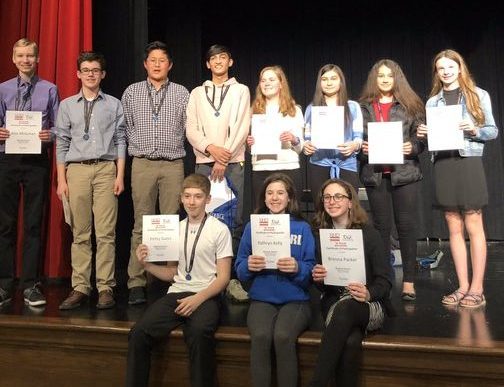
The Decorah Community School District is committed to educating all students considering the unique needs of each student. Among those are students who have abilities, potentials, and academic needs that require multidimensional instruction. Through an integrated approach, regular classroom teachers and ELP Facilitators work together to provide varied opportunities for these students. Differentiated programming will enable these students to maximize their learning in the classroom and community.
Differentiated Programming
Content Modification
This option allows the classroom teacher to use different levels of activities within a class to accommodate the needs and prior knowledge level of the student. Students may explore basically the same content but at a different level of complexity.
Independent Study
This may be used as a way to either accelerate or enrich learning at the high school level. Students displaying content mastery or having a special interest may contract with the teacher for an independent study project. This works best for students who are self-directed, have strong interests, and have a clear idea of what they would like to investigate. High school students may elect to plan and implement a semester or year-long independent study for credit in a subject/topic of their choice, under the direction of an ELP Facilitator.
In-Class Flexible Grouping
Students in each class are assigned to a small group for instruction. These groups may be heterogeneously or homogeneously grouped according to skill level. This type of grouping is utilized by classroom teachers at elementary and middle school levels.
Pull-Out Enrichment Opportunities
Students are selected for math or reading enrichment with the ELP Facilitator. They meet regularly. This service is provided to the third and fourth-grade.
Dual Enrollment
Advanced students enroll in higher-level coursework when proficiency at grade level has been demonstrated. For example, the middle school student takes a high school math course, or the advanced high school history student takes a university history course during the school day.
Replacement Class
Advanced Placement: In some curricular areas, students can choose to take an AP level course instead of the required high school level course. AP exams allow students to earn university credit and/or advanced university standing based on the examination score.
Edgenuity: When the situation warrants, students may participate in an E2020 online course instead of the required high school course.
Middle School Advanced ELA: Identified students may be enrolled in a replacement reading/language arts class offering advanced curriculum, pacing, and depth.
Acceleration
Subject Acceleration: Based on assessments, students are allowed to test out and bypass specific subjects or skill levels. They might receive instruction at a higher level with another group of students, yet remain with their peer group for most of their instruction. For the past several years, Decorah students with high math abilities have been successfully advanced a grade level. The decision to advance these students has occurred on an individual basis as the need arises. Students, parents, teachers, and administration are all involved in the decision to utilize this strategy.
Whole Grade Acceleration: Students move ahead one or more years, skipping levels in the normal sequence of promotions. This has traditionally been used successfully with highly gifted students as a method of acceleration. Parents, teachers, students, and administrators are involved in the process, and the Iowa Acceleration Scale is used as the tool for evaluation.
Gifted and Talented Education and Iowa Code
In regard to the ELP program, the following district policy, state laws, and administrative rules determine how gifted and talented education is provided and funded:
- Iowa Code section 256.11 details the required educational standards which included gifted and talented programs.
- Iowa Code section 257.42 states as part of their school improvement plan, school boards must annually submit program plans for gifted and talented children programs and budget costs to the Department.
- Iowa Code section 257.44 defines gifted and talented children.
- Iowa Code section 257.46 and Iowa Code section 257.8 describes gifted and talented funding.
- 281–Iowa Administrative Code 12.5(12) describes the provisions of gifted and talented student requirements in the state’s General Accreditation Standards for schools.
- 281–Iowa Administrative Code 59
View Iowa Code on Gifted and Talented Education
View Iowa Codes on Gifted and Talented funding
View Iowa Department of Education information on Gifted and Talented Education
For more information refer to the DCSD ELP Handbook.
K-4 ELP Teacher- Kari O’Hara
- (563) 382-3771
- Email Kari O’Hara
5-8 ELP Teacher- Dana Hogan
- (563) 382-8427
- Email Dana Hogan
9-12 ELP Teacher- Allysen Lovstuen
- (563) 382-3643
- Email Allysen Lovstuen